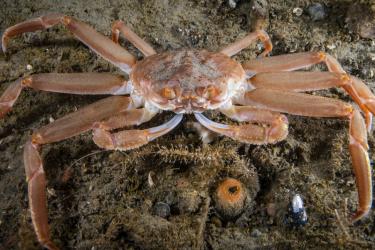The United States is committed to working bilaterally and multilaterally to combat illegal, unreported, and unregulated fishing and to ensure the effective management of bycatch of protected species and sharks on the high seas, creating a level playing field for U.S. fishermen and safeguarding U.S. sustainable fisheries. Ensuring the sustainable management of domestic and global fisheries, including the catches of shark and bycatch of protected species, remains a top priority for NOAA Fisheries. We will continue to advocate for strong, scientific-based management measures, working with our global partners, and international organizations.
The 2017 biennial report to Congress on improving international fisheries management highlights U.S. findings and analyses of foreign IUU fishing activities and bycatch of protected species and shark catch on the high seas where nations do not have a regulatory program comparable to the United States.
The United States is a global leader in the responsible management of marine fisheries, and combating IUU fishing, which impacts the economic and environmental sustainability of U.S. and global fisheries. IUU fishing undermines economic opportunities for U.S. fishermen and poses a direct threat to food security and socio-economic stability in many parts of the world.
The United States identifies countries whose fishing vessels were reported to be engaged in these activities, and consults with those countries to improve their fisheries management and enforcement practices. Nations identified for having vessels engaged in IUU fishing are required to take appropriate corrective action to address the activities described in the biennial report.
Based on information provided by nations during the consultations, the United States issues a certification decision which is published in the next report to Congress. A positive certification is issued if the nation has provided evidence of actions that address the activities for which it was identified. If the nation cannot demonstrate sufficient action has been taken, a negative certification may be issued and the nation is subject to U.S. port restrictions for their fishing vessels, and import restrictions on certain fish or fish products. The United States actively works with our international partners to combat IUU fishing activities in a cooperative and transparent manner.
2017 Biennial Report to Congress
The United States will work with the nations identified in the 2017 Report to Congress to encourage them to take action to address their IUU fishing activities.
Identification
Three countries—Ecuador, Mexico, and Russia—are identified in the latest report for having vessels reported to be engaged in IUU fishing activities from 2014 to 2016. NOAA Fisheries will engage in consultations with these newly identified nations to press for corrective action.
Certification
During the past two years, the U.S. government consulted with the six nations identified in the 2015 biennial report to encourage them to take action against their vessels that engaged in IUU fishing activities. Colombia, Ecuador, Nicaragua, Nigeria, and Portugal took appropriate action to address violations identified in the 2015 report through the adoption of new or amended regulations and by sanctioning vessels or responsible persons. The implementation of these actions resulted in a positive certification. Mexico received a negative certification for unauthorized fishing in U.S. waters and overfishing of stocks shared by the United States, which have adverse impacts on such stocks, including red snapper. It is now subject to denial of port privileges and import restrictions on certain fish and fish products. We will continue to work with Mexico to encourage appropriate corrective action.
Bycatch and Shark Catch
No countries were identified for bycatch of protected living marine resources or for shark catch on the high seas in the 2017 biennial report.
___________________________________________
The biennial report to Congress is a requirement of the High Seas Driftnet Fishing Moratorium Protection Act, as amended by the Magnuson-Stevens Fishery Conservation and Management Reauthorization Act.




